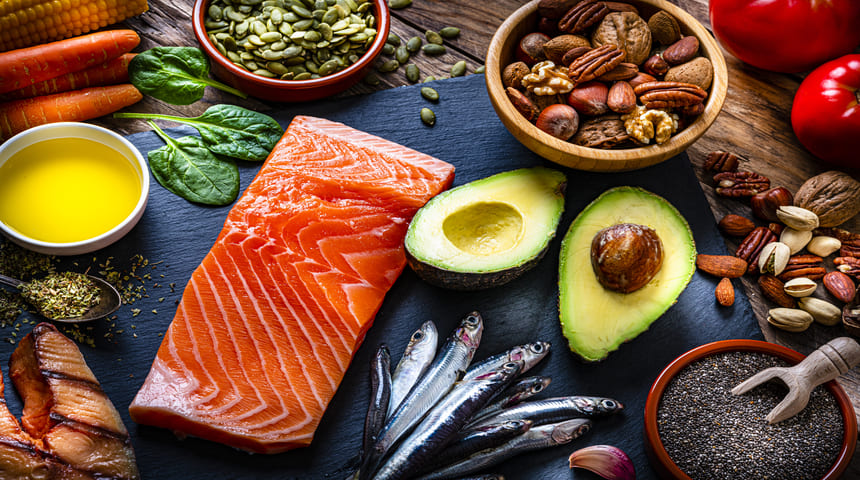Food safety is of the utmost importance for anyone with a compromised or recovering immune system. But the holidays can pose extra challenges for cancer patients struggling with smell and taste aversions caused by treatment-related side effects. For patients, caregivers and friends, this can threaten to put a damper on festivities. However, some tips and strategies can make navigating the holiday table easier — and more joyful — for those gathered.
Food Safety First: An Easy Checklist
For anyone who will be preparing food for immunocompromised individuals, paying extra attention is a must. Know the four basic food safety steps:
-
Clean: Wash hands and surfaces before handling food items and prior to cooking. Before and after meal prep, clean counter tops, cutting boards and utensils with warm soapy water. Rinse all fresh produce with water prior to use.
-
Separate: Don’t cross-contaminate. Wash utensils and cutting boards often. Produce that requires refrigeration can be stored in vegetable bins or on shelves above raw meats, poultry or seafood.
-
Cook: Heat food to safe temperatures.
-
Chill: Refrigerate promptly. Storing fresh produce in cloth produce bags or perforated plastic bags will allow air to circulate. Do not keep cut, peeled or cooked fruits and vegetables at room temperature for more than two hours (or one hour if the temperature is above 90F) and store in the refrigerator in covered containers.
Adhering to these protocols benefits everyone, so you should memorize and practice them, and educate younger family members as you prepare meals together. For those with cancer and weakened immune systems, this chart is available for download. Keep it handy on the fridge or mobile phone for quick reference when cooking.
Tricks to Combat Aversions to Smell and Taste
Cook and eat outdoors if possible. If this is not an option, open windows or turn on fans to help with air circulation. Keep in mind that hotter food items typically result in stronger smell. Prior to consuming a meal, you may want to let it cool off. Beware of specific foods that may have strong odors, such as eggs, breakfast meats and seafood.
Taste aversions may be somewhat more difficult to navigate, since many patients struggle with experiencing a metallic taste or foods tasting flavorless. Some tips:
-
Avoid any metal or aluminum objects and stick to disposables, glassware, plastic or Styrofoam. Adding citrus (lemon or lime juice) to a food or beverage also may help cut the metal taste.
-
Try various seasonings, spices and marinades to enhance those food flavors.
-
Try some new foods and textures — a new flavor cream cheese or salad dressing, or creamy peanut butter instead of chunky. This helps to reduce your expectations on what it should taste like, and you won’t be disappointed.
-
Consider avoiding the foods you love during this time — otherwise, you may develop an aversion to them.
-
Rinsing your mouth with an alcohol-free mouth rinse, such as baking soda, salt and water, may also be beneficial for taste aversions. Try rinsing before and after meals to cleanse your palate.
Keep Meals Simple and Enjoyable
Stick to what you know and love, and don’t try to overcomplicate recipes. If experiencing treatment-related side effects, you may have to deviate from some foods that you traditionally look forward to. If you’re struggling with poor appetite or early satiety, don’t try to push yourself to consume more than you can — stick to small, frequent meals.
Since fatigue is very common from chemotherapy, if you can’t make a meal or must leave early, you can freeze food and enjoy it later. Keep easy-to-grab snacks around such as fruit and yogurt, cheese, peanut butter and crackers, hot cereal and soup.
When in Doubt, Throw It Out
If undergoing treatment during the holidays, be sure to follow these extra precautions to reduce your exposure to food-borne illnesses, as instructed by the U.S. National Library of Medicine:
-
Be cautious with meal offerings coming from outside the home and make sure you trust where they are coming from.
-
If you can’t remember how long something has been sitting on the counter, don’t take any risks — toss it.
-
Watch expiration dates and toss anything expired.
-
Eat a wide variety of fruits and vegetables — this is nutritionally beneficial and may help limit exposure to any one type of pesticide residue.
-
Avoid buffets, salad bars and potlucks. If dining out, avoid peak times and be sure food is thoroughly cooked.
-
Avoid specialty foods such as raw fish and shellfish, undercooked eggs, soft cheeses including Brie, Camembert, Roquefort, Stilton, Gorgonzola and Bleu. Skip the eggnog!
Choose to Stay in Touch
Sign up to receive the latest health news and trends, wellness & prevention tips, and much more from Orlando Health.
Sign Up




